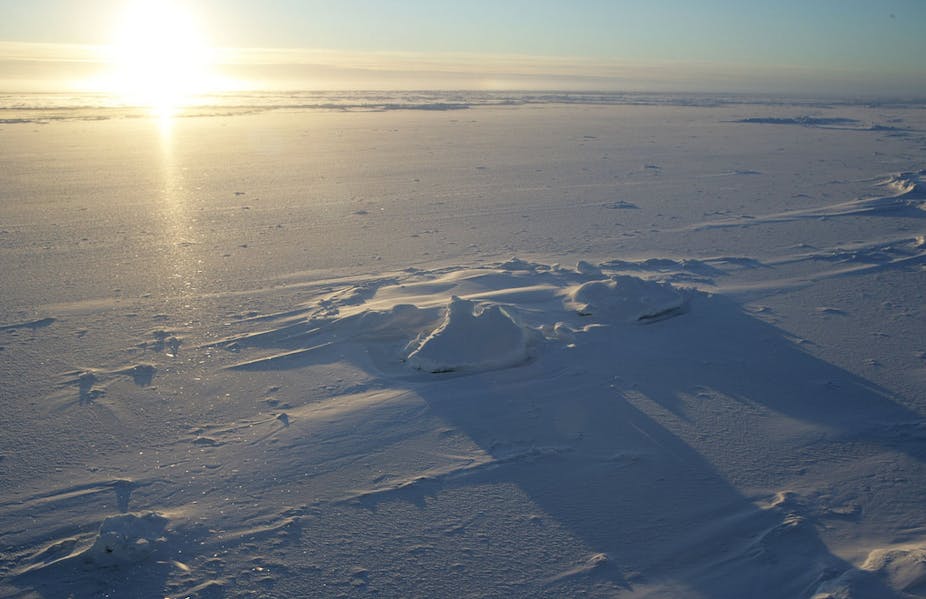US Military's Arctic Ambitions: Examining The Proposed Transfer Of Greenland To Northern Command

Table of Contents
Strategic Rationale Behind the Proposed Transfer
The proposed transfer of operational control to NORTHCOM is driven by a clear strategic rationale centered on enhancing US national security and countering the growing influence of Russia and China in the Arctic. This region is rich in natural resources, including oil, gas, and rare earth minerals, and boasts vital shipping routes that are becoming increasingly accessible due to melting sea ice.
- Increased military readiness and response times in the Arctic: Placing assets under NORTHCOM’s direct command streamlines operations and facilitates quicker responses to potential threats.
- Enhanced surveillance capabilities to monitor Russian and Chinese activities in the region: NORTHCOM's expertise in monitoring and intelligence gathering will bolster the US's ability to track and respond to activities by competing powers.
- Improved coordination between US military branches operating in the Arctic: This unified command structure improves interoperability and efficiency among different military services.
- Secure access to critical resources and infrastructure in Greenland: Greenland's strategic location provides crucial access points for surveillance and potential resource extraction.
- Counter-terrorism and homeland security operations in the Arctic: NORTHCOM's expanded presence enhances the nation's ability to address emerging threats in the region.
The Arctic is no longer a remote periphery. The growing geopolitical competition, fueled by resource scarcity and the opening of new shipping lanes, necessitates a robust US military presence. Transferring control to NORTHCOM is seen as a crucial step in ensuring US interests are protected and its influence secured.
Challenges and Concerns Associated with the Transfer
While the strategic benefits of the proposed transfer are clear, several challenges and concerns need careful consideration. These concerns range from international relations to environmental impact and public opinion.
- Potential strain on US-Danish relations: The transfer could strain relations with Denmark, which holds sovereignty over Greenland. Careful diplomacy and negotiation are essential to maintain strong bilateral ties.
- Concerns about Greenland's sovereignty and autonomy: Greenlanders must be central to any decision affecting their land and resources. Respecting Greenlandic autonomy is vital for successful implementation.
- Environmental impact of increased military activity: Increased military presence necessitates a robust environmental protection plan to minimize the footprint on this sensitive ecosystem. Sustainable practices must be prioritized.
- High costs associated with upgrading infrastructure in Greenland: Modernizing infrastructure to support increased military operations will require significant financial investment.
- Public opinion in Greenland and the US regarding the transfer: Open dialogue and transparency are crucial to address public concerns and build support for the initiative.
Addressing these concerns effectively is essential for the success of the proposed transfer and the maintenance of positive relationships with Greenland and Denmark.
The Role of Climate Change in Shaping Arctic Military Strategy
Climate change is fundamentally reshaping the Arctic, creating both opportunities and challenges for military strategists. The melting of sea ice is opening up new shipping routes and making previously inaccessible areas reachable.
- Opening of new shipping routes and resource opportunities: These routes significantly impact global trade and access to resources, increasing their strategic importance.
- Increased accessibility for military operations: Melting ice expands the potential operational areas for military vessels and aircraft.
- New challenges for search and rescue operations: Increased activity in previously inaccessible areas necessitates updated search and rescue capabilities.
- Need for adaptation of military infrastructure and equipment to Arctic conditions: Equipment and infrastructure must be adapted to extreme Arctic conditions.
- Environmental protection and responsible resource management: Sustainable practices are critical to preserving the Arctic environment.
Climate change is not simply an environmental issue; it is a geopolitical one, drastically altering the strategic landscape of the Arctic and demanding a dynamic response from militaries worldwide.
The Impact on Greenland's Economy and Society
The proposed transfer could have significant economic and social consequences for Greenland.
- Potential economic benefits from increased US investment: US investment in infrastructure and related projects could boost Greenland's economy.
- Creation of new jobs and infrastructure projects: The increased military presence could create jobs and stimulate economic growth.
- Potential social disruption and cultural impacts: The influx of personnel and activity could lead to societal changes, requiring careful management.
- Importance of community engagement and consultation: Meaningful engagement with Greenlandic communities is vital to mitigate potential negative impacts and ensure the project's success.
A balanced approach that prioritizes both economic development and the preservation of Greenlandic culture and society is paramount.
Conclusion
The proposed transfer of operational control of US military assets in Greenland to NORTHCOM reflects the growing strategic importance of the Arctic. While offering enhanced military capabilities and readiness, it presents significant challenges regarding sovereignty, environmental protection, and economic considerations. A successful outcome demands close collaboration with Greenland and Denmark, coupled with careful planning to mitigate potential negative consequences.
Understanding the implications of the US Military's increased Arctic presence, particularly regarding the proposed Greenland transfer, is crucial for informed discussion about national security and the future of the Arctic region. Further research and public discourse on the strategic implications of the US military's Arctic ambitions are vital for navigating this complex geopolitical landscape responsibly.

Featured Posts
-
 Stock Market Valuations Bof As Argument For Investor Calm
May 10, 2025
Stock Market Valuations Bof As Argument For Investor Calm
May 10, 2025 -
 Solve Nyt Strands Game 403 Thursday April 10th Answers And Hints
May 10, 2025
Solve Nyt Strands Game 403 Thursday April 10th Answers And Hints
May 10, 2025 -
 Chinas Canola Supply Chain Adapting To The Canada Trade Shift
May 10, 2025
Chinas Canola Supply Chain Adapting To The Canada Trade Shift
May 10, 2025 -
 Metas Whats App Spyware Verdict A Costly Setback
May 10, 2025
Metas Whats App Spyware Verdict A Costly Setback
May 10, 2025 -
 Trump Executive Orders Impact On Transgender Individuals
May 10, 2025
Trump Executive Orders Impact On Transgender Individuals
May 10, 2025
